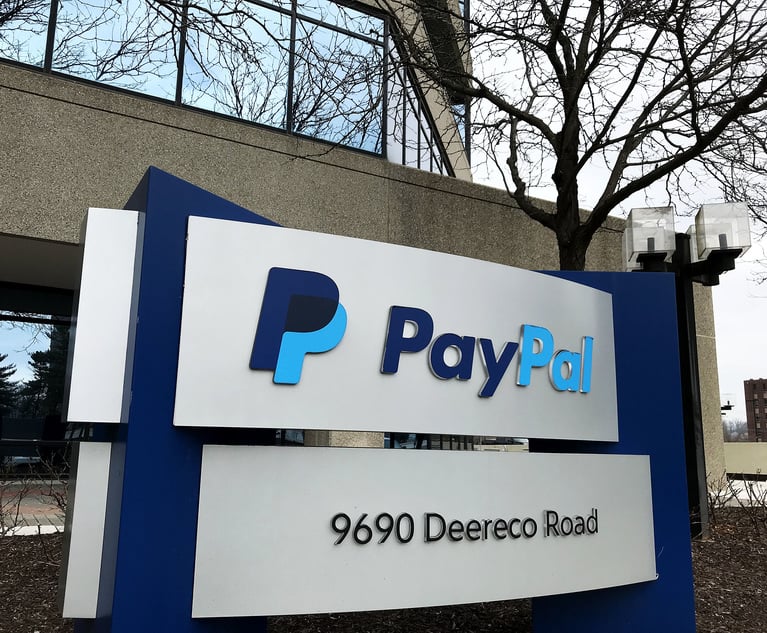Capital One Seeking to Revive Intellectual Ventures Antitrust Case
The bank goes before the Federal Circuit on Monday, contending that IV's massing of thousands of financial services patents and threatening "endless litigation" is anti-competitive. A district judge ruled the acquisitions can't be separated from IV's assertion activities, which are constitutionally protected.
May 31, 2019 at 06:17 PM
3 minute read
 Robert Freitas of Freitas Angell & Weinberg.
Robert Freitas of Freitas Angell & Weinberg.
Capital One's novel antitrust case against Intellectual Ventures was the buzz of the Silicon Valley patent bar a couple of years ago, but the bank's loss on summary judgment combined with IV's less aggressive acquisitions has cooled the chatter. However, Intellectual Ventures v. Capital One will be back on the front burner Monday when it lands for a hearing at the U.S. Court of Appeals for the Federal Circuit.
IV comes in with some momentum—a $43 million jury verdict against Ericsson and T-Mobile in March. Department of Justice antitrust chief Makan Delrahim had been scheduled to make an amicus appearance, but will yield to one of his colleagues.
The five-year-old case began with Intellectual Ventures suing a number of large financial institutions for patent infringement. Capital One counterclaimed, accusing IV of aggregating thousands of poor-quality patents that tread on financial services and then threatening “endless litigation” if its license demands—according to Capital One, an opening bid of $131 million for a five-year global license—weren't met. U.S. District Judge Paul Grimm of the District of Maryland ruled that while it's “hard to deny that there is something concerning from an antitrust perspective,” IV's suit was immunized from attack by the Noerr-Pennington doctrine.
Latham & Watkins partner Matthew Moore will argue for Capital One that IV's acquisition strategy alone, which he says leaves banks no options for designing around or licensing alternative technology from others, is anti-competitive and not protected by Noerr-Pennington.
Robert Freitas of Freitas & Weinberg argues that Capital One's case is “a fantasy”—that IV holds only a tiny fraction of the patents in the relevant class, and that in any event a would-be monopolist would have nothing to gain from amassing patents without any plan for asserting them. He also argues the number IV presented was not a licensing demand, and that other banks engaged in extended negotiations with IV while Capital One snubbed them.
The Justice Department filed an amicus brief agreeing with Capital One that Noerr-Pennington does not protect anti-competitive patent acquisitions from antitrust liability, without expressing further views about the case. Deputy Assistant Attorney General Michael Murray subbed in for Delrahim on Wednesday and will present the DOJ's amicus argument.
This content has been archived. It is available through our partners, LexisNexis® and Bloomberg Law.
To view this content, please continue to their sites.
Not a Lexis Subscriber?
Subscribe Now
Not a Bloomberg Law Subscriber?
Subscribe Now
NOT FOR REPRINT
© 2025 ALM Global, LLC, All Rights Reserved. Request academic re-use from www.copyright.com. All other uses, submit a request to [email protected]. For more information visit Asset & Logo Licensing.
You Might Like
View All
'Biggest Influencer Scam of All Time'?: PayPal Accused of Poaching Commissions Via Its 'Honey' Browser Extension



As AI-Generated Fraud Rises, Financial Companies Face a Long Cybersecurity Battle
Trending Stories
- 1SDNY US Attorney Damian Williams Lands at Paul Weiss
- 2Litigators of the Week: A Knockout Blow to Latest FCC Net Neutrality Rules After ‘Loper Bright’
- 3Litigator of the Week Runners-Up and Shout-Outs
- 4Norton Rose Sues South Africa Government Over Ethnicity Score System
- 5KMPG Wants to Provide Legal Services in the US. Now All Eyes Are on Their Big Four Peers
Who Got The Work
Michael G. Bongiorno, Andrew Scott Dulberg and Elizabeth E. Driscoll from Wilmer Cutler Pickering Hale and Dorr have stepped in to represent Symbotic Inc., an A.I.-enabled technology platform that focuses on increasing supply chain efficiency, and other defendants in a pending shareholder derivative lawsuit. The case, filed Oct. 2 in Massachusetts District Court by the Brown Law Firm on behalf of Stephen Austen, accuses certain officers and directors of misleading investors in regard to Symbotic's potential for margin growth by failing to disclose that the company was not equipped to timely deploy its systems or manage expenses through project delays. The case, assigned to U.S. District Judge Nathaniel M. Gorton, is 1:24-cv-12522, Austen v. Cohen et al.
Who Got The Work
Edmund Polubinski and Marie Killmond of Davis Polk & Wardwell have entered appearances for data platform software development company MongoDB and other defendants in a pending shareholder derivative lawsuit. The action, filed Oct. 7 in New York Southern District Court by the Brown Law Firm, accuses the company's directors and/or officers of falsely expressing confidence in the company’s restructuring of its sales incentive plan and downplaying the severity of decreases in its upfront commitments. The case is 1:24-cv-07594, Roy v. Ittycheria et al.
Who Got The Work
Amy O. Bruchs and Kurt F. Ellison of Michael Best & Friedrich have entered appearances for Epic Systems Corp. in a pending employment discrimination lawsuit. The suit was filed Sept. 7 in Wisconsin Western District Court by Levine Eisberner LLC and Siri & Glimstad on behalf of a project manager who claims that he was wrongfully terminated after applying for a religious exemption to the defendant's COVID-19 vaccine mandate. The case, assigned to U.S. Magistrate Judge Anita Marie Boor, is 3:24-cv-00630, Secker, Nathan v. Epic Systems Corporation.
Who Got The Work
David X. Sullivan, Thomas J. Finn and Gregory A. Hall from McCarter & English have entered appearances for Sunrun Installation Services in a pending civil rights lawsuit. The complaint was filed Sept. 4 in Connecticut District Court by attorney Robert M. Berke on behalf of former employee George Edward Steins, who was arrested and charged with employing an unregistered home improvement salesperson. The complaint alleges that had Sunrun informed the Connecticut Department of Consumer Protection that the plaintiff's employment had ended in 2017 and that he no longer held Sunrun's home improvement contractor license, he would not have been hit with charges, which were dismissed in May 2024. The case, assigned to U.S. District Judge Jeffrey A. Meyer, is 3:24-cv-01423, Steins v. Sunrun, Inc. et al.
Who Got The Work
Greenberg Traurig shareholder Joshua L. Raskin has entered an appearance for boohoo.com UK Ltd. in a pending patent infringement lawsuit. The suit, filed Sept. 3 in Texas Eastern District Court by Rozier Hardt McDonough on behalf of Alto Dynamics, asserts five patents related to an online shopping platform. The case, assigned to U.S. District Judge Rodney Gilstrap, is 2:24-cv-00719, Alto Dynamics, LLC v. boohoo.com UK Limited.
Featured Firms
Law Offices of Gary Martin Hays & Associates, P.C.
(470) 294-1674
Law Offices of Mark E. Salomone
(857) 444-6468
Smith & Hassler
(713) 739-1250






